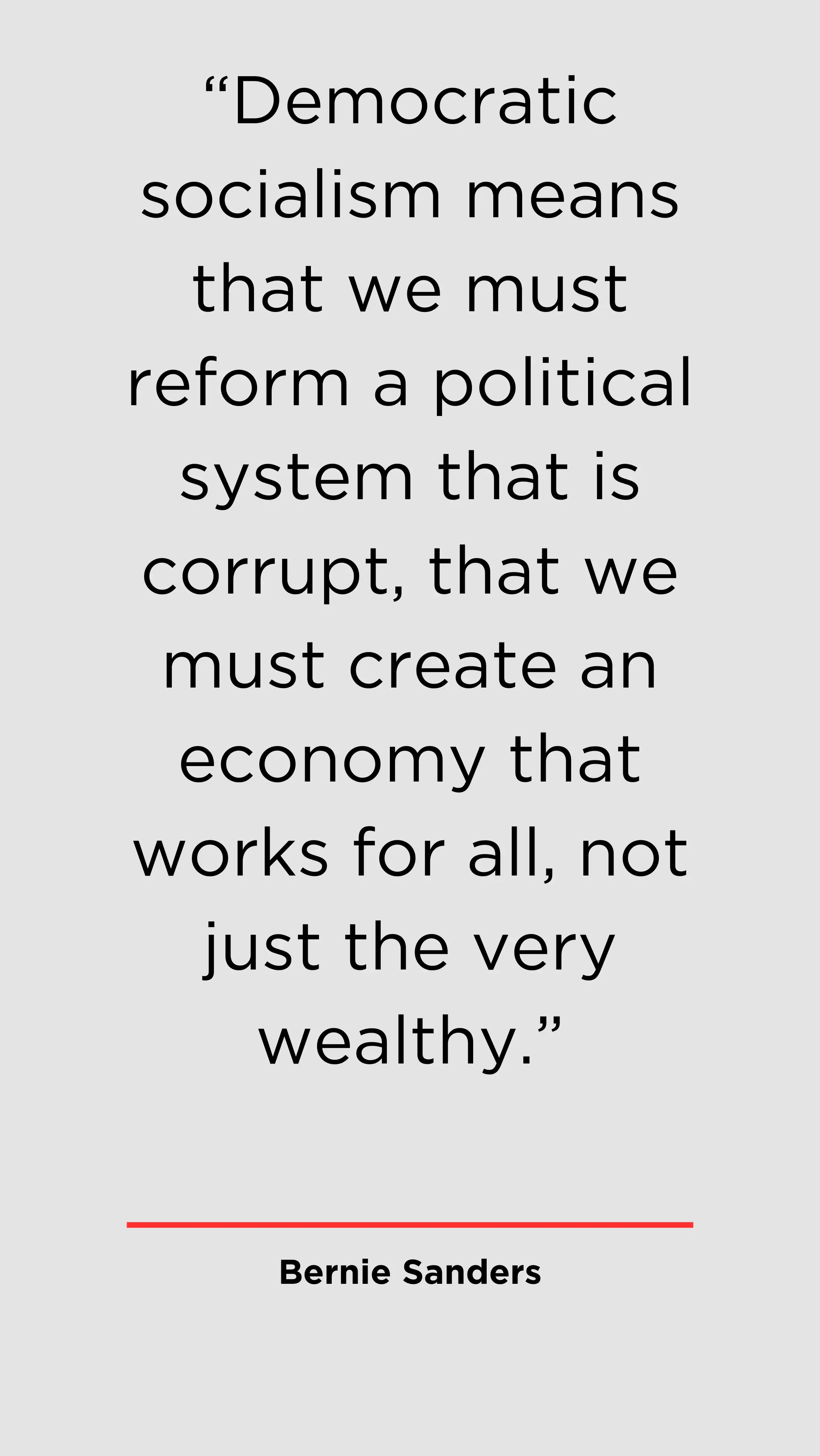Bernie Sanders, a self-proclaimed democratic socialist, emerged as a prominent and influential figure in American politics, particularly during the 2016 and 2020 presidential campaigns. Born on September 8, 1941, in Brooklyn, New York, Sanders’ political career evolved from grassroots activism to national prominence.
Early Life and Activism
Bernie Sanders deeply committed himself to social justice and activism during his early life. Born and raised in Brooklyn, New York, he developed a keen sense of social inequality and economic injustice at an early age. His political awakening took shape during his college years when he became involved in civil rights and anti-war protests. In the late 1960s, Sanders made a significant move to Vermont, where he continued to nurture his passion for activism. In the Green Mountain State, he became deeply involved in local politics and community organizing efforts, advocating for affordable housing, healthcare, and workers’ rights. This period of his life laid the foundation for his later political career and his unwavering dedication to progressive causes.
Sanders’ move to Vermont marked a pivotal moment in his life as it was there that he honed his skills as a grassroots organizer and developed a reputation as a champion of social and economic justice. His early activism and commitment to the welfare of working-class Americans became a defining feature of his political identity. This early chapter of his life demonstrated his unwavering commitment to fighting for the underprivileged and marginalized, a commitment that would continue to guide him throughout his long and influential political career.
Bernie Sanders: Mayor of Burlington
In 1981 Bernie Sanders entered electoral politics when he won the mayoral election in Burlington, Vermont, launching his larger political career from this position. As mayor, Sanders pursued a progressive agenda that prioritized the needs of the working class and the marginalized. During his tenure, he demonstrated a commitment to affordable housing, environmental sustainability, and involving the public in decision-making. Under his leadership, Burlington’s local government shifted its focus towards social and economic justice, and Sanders earned a reputation as a fierce advocate for the rights and well-being of everyday citizens. His time as mayor laid the groundwork for his future political campaigns and solidified his standing as a champion of progressive ideals.
Sanders’ mayoral experience in Burlington was a formative period in his political journey, demonstrating his ability to translate his activism into concrete policies and governance. His dedication to the principles of social and economic justice, as well as his willingness to challenge the status quo, resonated with the people of Burlington and set the stage for his successful transition to higher office. Sanders’ tenure as mayor not only transformed the political landscape of Burlington but also foreshadowed his national role as a leading voice for progressive policies and a tireless advocate for the working class in the United States.
Congressional Career
In 1981 Bernie Sanders entered electoral politics when he won the mayoral election in Burlington, Vermont, launching his larger political career from this position. Then, In 1990, he made the leap to national politics by winning a seat in the U.S. House of Representatives, representing Vermont’s at-large congressional district. During his time in the House, Sanders continued to champion policies aimed at reducing income inequality, advocating for universal healthcare, and challenging the influence of corporate interests in government. His principled stance and unapologetic progressivism earned him a dedicated following, and he became known as the “independent socialist” in Congress.
Came 2006, Bernie Sanders took another significant step in his political career when he was elected to the U.S. Senate, representing Vermont. His tenure in the Senate solidified his reputation as one of the most prominent and consistent progressive voices in American politics. Sanders continued to push for progressive policies, including a higher minimum wage, affordable college education, and comprehensive healthcare reform. His 2016 and 2020 presidential campaigns brought many of these issues to the forefront of national discourse, energizing a new generation of voters and reshaping the Democratic Party’s platform.
Bernie Sanders: Independent Senator and Progressive Stalwart
While Bernie officially identified as an independent, his alignment with the Democratic Party allowed him to leverage their resources and platform to advance his progressive agenda. Sanders’ commitment to progressive causes was unwavering, and he became a stalwart champion of issues like healthcare reform, advocating for a single-payer healthcare system that would provide universal coverage. He also passionately addressed income inequality, pushing for policies to raise the minimum wage and increase taxes on the wealthy. Sanders’ dedication to campaign finance reform, particularly his rejection of corporate PAC money, resonated with voters who sought to reduce the influence of money in politics.
Throughout his career, Bernie Sanders remained a consistent and unapologetic advocate for the progressive values he held dear. His presidential campaigns in 2016 and 2020 further elevated these issues, inspiring a grassroots movement and reshaping the Democratic Party’s platform to be more aligned with his vision. Sanders’ impact on American politics extended beyond policy proposals; he ignited a passion for progressive ideals in a new generation of voters, leaving an enduring legacy that continues to shape the national conversation on issues of healthcare, income inequality, and campaign finance reform.
Presidential Campaigns
Bernie’s presidential campaigns in both 2016 and 2020 were marked by their profound impact on the American political landscape. Running as a progressive champion, Sanders garnered widespread support from a dedicated and passionate base of voters who rallied behind his calls for transformative policies. In 2016, his campaign against Hillary Clinton served as a rallying cry for progressive ideals, particularly his advocacy for universal healthcare through a Medicare for All system and the concept of free college education. Although he did not secure the nomination, his candidacy was instrumental in pushing the Democratic Party to adopt more progressive policy positions, reflecting the growing influence of his ideas within the party.
Moreover, his decision to run for president again in 2020 demonstrated his commitment to advancing his progressive policy agenda. Once more, his campaign struck a chord with a diverse coalition of voters, with his proposals for healthcare reform and addressing income inequality taking center stage. While he did not ultimately secure the nomination, his campaigns left an indelible mark on American politics, reshaping the national conversation on critical issues and pushing the Democratic Party to embrace more progressive policies.
Bernie Sanders: The “Bernie Bros” Phenomenon
The term “Bernie Bros” refers to a subset of Senator Bernie Sanders’ most vocal and aggressive supporters during his Democratic presidential nomination campaigns in both 2016 and 2020. Often used pejoratively, it characterizes young, white, male, and progressive voters who are perceived as hostile towards other candidates and their supporters, particularly women and indigenous peoples.
Originating in 2015, the term was coined by Robinson Meyer of The Atlantic, who observed certain behaviors among Sanders supporters on social media. However, critics argue that it oversimplifies Sanders’ diverse support base and detracts from his policy proposals.
This phenomenon highlights the evolving role of digital platforms in modern politics and the power of online communities to shape and influence political movements. While these passionate supporters were instrumental in promoting Sanders’ agenda and expanding his base of supporters, their actions also underscored the challenges of managing and moderating online political discourse. The legacy of the “Bernie Bros” phenomenon serves as a cautionary tale for political movements in the digital age, highlighting the need to balance enthusiasm and activism with respect and constructive engagement to foster a healthy and inclusive political discourse.
Online Activism and Social Media
Bernie Sanders’ presidential campaigns were notable for their adept use of social media and online activism as powerful tools to engage supporters and spread his message. His campaign teams recognized the potential of platforms like Twitter, Facebook, and Instagram as vital channels for connecting with a younger, tech-savvy demographic and mobilizing grassroots support. Through these platforms, Sanders’ campaigns effectively harnessed the enthusiasm of his base, encouraging them to donate, volunteer, and organize at the local level. The online activism surrounding Sanders’ campaigns also facilitated the rapid dissemination of information and the ability to respond to breaking news and events in real-time, creating a dynamic and responsive campaign infrastructure that resonated with a wide array of supporters.
One of the most striking aspects of Sanders’ online activism was its impact on fundraising. His campaigns shattered records for online donations, with small-dollar contributions flooding in from across the country. This not only demonstrated the power of grassroots fundraising but also underscored the potential for political candidates to rely on a distributed network of small donors rather than traditional big-money contributions. In this way, Bernie Sanders’ campaigns served as a trailblazer in the use of social media and online activism, leaving a lasting impact on political campaigning in the digital age and showcasing the potential for candidates to connect directly with their supporters, mobilize resources, and build a movement that transcends traditional campaign structures.
Bernie Sanders: Policy Impact and Influence
Although Bernie did not secure the Democratic nomination in either of his presidential campaigns, his progressive policy positions and ideas left an indelible mark on the party’s platform and direction. Sanders’ advocacy for Medicare for All, a universal healthcare system, became a central topic of discussion among Democratic candidates and voters, pushing healthcare reform to the forefront of the party’s agenda. Similarly, his call for a $15 minimum wage found resonance within the party and led to legislative efforts to raise the federal minimum wage. Sanders’ influence extended to other areas, such as climate change policy, where his advocacy for a Green New Deal framework helped shape the party’s approach to addressing environmental challenges.
Sanders’ impact on the Democratic Party goes beyond policy alone. His campaigns energized a passionate base of supporters, particularly among young voters, who were drawn to his unapologetic progressivism and calls for political revolution. This surge of grassroots activism has had a lasting influence on the party’s internal dynamics, pushing it to embrace more progressive policies and prioritize issues such as income inequality and economic justice. In this way, Bernie Sanders’ legacy is not solely defined by his presidential bids but also by his ability to shift the political discourse and push the Democratic Party toward a more progressive and forward-thinking agenda.

Legacy and Impact
Bernie Sanders’ political legacy is defined by his unyielding commitment to progressive ideals and his remarkable ability to mobilize a passionate and dedicated base of supporters. Throughout his career, he continuously advocated issues like universal healthcare, income inequality, and campaign finance reform with a rare consistency and authenticity that resonated deeply with a broad spectrum of Americans. His influence extended beyond electoral politics, as he inspired a new generation of activists and candidates who embraced his vision for a more just and equitable society.
Sanders’ impact on American politics is perhaps most evident in the way his policy proposals and progressive agenda have reshaped the Democratic Party. His campaigns pushed the party to embrace policies like Medicare for All and a $15 minimum wage, which have since become central tenets of its platform. Moreover, his emphasis on grassroots organizing and small-dollar fundraising has had a lasting impact on the way political campaigns are conducted in the digital age. Bernie Sanders’ legacy serves as a testament to the power of principled advocacy, grassroots mobilization, and the enduring influence of a politician who remained true to his convictions throughout his career.




